#Even if I disagree with the characterisation
Text
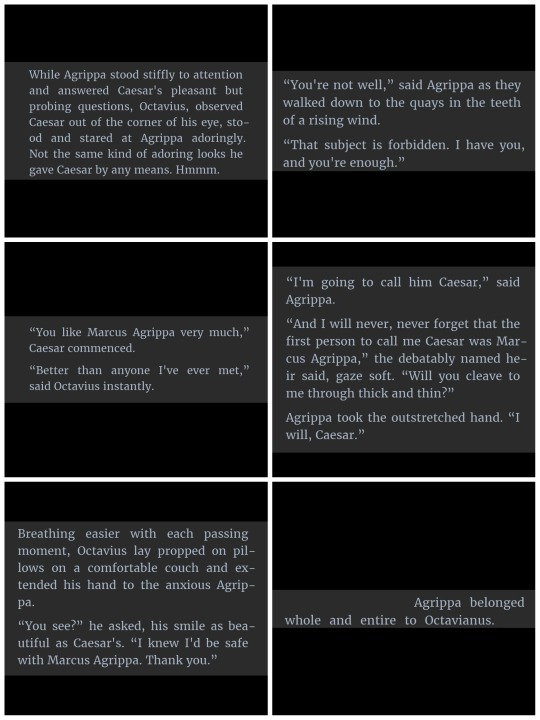
so i finally finished the october horse
#that was one of the books ever. it did make me more unwell about those guys which is. something.#(the way they're written DOES feel very much in love and vaguely homophobic at the same time i understand now)#colleen absolutely insisting octavian was a big sad earnest grey eyes long blonde hair twink but also an evil evil little snake in disguise#was pretty funny but i did disagree with some of the stuff relating to him#not that i am an authority on that in any way as i have not even been interested in rome for six months yet#overall it was ?? a book ?? i enjoyed it quite a lot tbh - dont know enough about the conspirators yet to commen#t on their characterisation but it did feel a little Off sometimes#and the caesar worship was. irritating. idk ithink it would have been better if she'd given him diarrhoea like dio did#but. fan overall i like d it quite alot it was fun. roman revolution time now boy (got it from the library today so excited)#guys tag#read ing#mor
10 notes
·
View notes
Text
little rant about saka-nagu-rion trio and appearances and moving on with your life
Sakamoto retired and got fat. Whether or not Slurion is actually Rion is not really resolved, but as much as she thinks of herself as evidently being Rion, it's pretty clear there's uh... a drastic difference in appearance here compared to Rion-in-life. Nagumo is the only one of the three who's kept his looks since their time in the JCC.
And that's funny, you know, because obviously Nagumo's whole thing is that he changes his appearance and puts on disguises and what-not. But they're always temporary and at the end of the day it's not really a reflection of Nagumo himself. It's to get a job done or it's for a bit.
Sakamoto moving on with his life (if it weren't for that damn bounty), Rion dying or... whatever's going on with her. Nagumo remains an assassin and an Order member. He remains focused on resolving Rion's death even though Sakamoto has long moved on with his own life.
It's like this emotional stagnation got conveyed through his appearance not really changing over the years. The outward appearance that he's moved on, like how there's the outward but not true or permanent change of appearance. But nothing deeper than the exterior. It's 2am for me, by the way.
#sakamoto days#sakamoto days spoilers#<- might as well even tho i dont think any of this is super recent#what pronouns do ppl use for slurion anyways i see a lot of ppl on twitter use he/him but. i disagree for reasons#uhh also. been a min since i reread so please tell me if i've gone insane#and also ahahha this too is gap characterisation ahaha stares at a wall.#i don't think sakadays is necessarily ripe for deep literary analysis but there's not *nothing* being conveyed#apolloposting
9 notes
·
View notes
Text
tma fandom make me so mad sometimes
#look to the left. people who genuinely believe jon is inherently evil and unworthy of redemption.#look to the right. people who genuinely believe jon did literally nothing wrong and was justified + correct#look to the left again. people saying elias is gay and homophobic whilst also having headcanons that are basically just#homophobic stereotypes. look back to the right. i cant even begin to describe what theyre going to tim + martin + sasha.#fanon is so ubiquitous that if you disagree with it youre Just Fucked because nobody knows how to characterise anymore#sigh.#sorry to anyone whos heard me make the same 10 complaints about tma fandom a billion times over lol
15 notes
·
View notes
Text
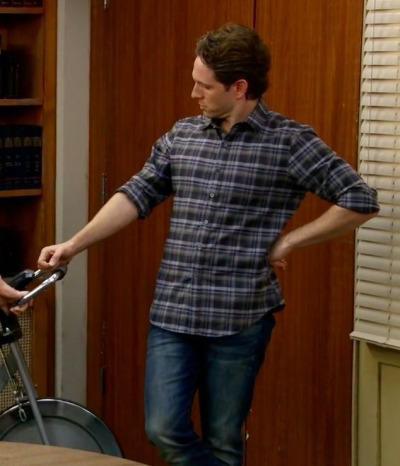
not going to write out the essay forming in my head but it’s so crazy to me like i know my vision of dennis is not universal and is mostly influenced by me thinking it’s fun to woobify him with fellow tumblrinas but it’s like…..how are people watching the whole show and thinking he is actually cold hearted angry and calculated and a genius potentially a secret serial killer and that this extends to his relationship with the gang…like idk it’s just funny to me…..there is so much in the show that goes against that
#like I get how he has been characterised across certain seasons but bro glenn himself disagrees…..#also even when the show does play w that it’s like…..#my brain isn’t working bc I might have covid btw#but like. to me all the jokes that allude to those things are more complex than just oh he’s this and that#or oh he might be!!! we never know!!#and at the end of the day there’s so much characterisation that tells us he’s ultimately not those things/could not be those things#he’s a dumbass!! he’s insecure!!!#there are thoughts in my brain rn about this that I can’t articulate on account of the possible covid#like I know the dennis in my head is not the canon dennis. I like to get silly with it#but his vulnerability and his insecurity and dumbassery and his masking as THERE and not exactly subtle!!!#ultimately people can read him however they want but ultimately this is abt how insane it is to me#that ppl actually thought he wanted mac to die from the nuts and was disappointed that he wasn’t….like BRO#I think this + the idea that the gang cannot change AT ALL is like….actually let’s unpack this#need to take a nap or smth#and then make tumblr essays about the piss and shit show#also btw when I say this I’m not like. disregarding the times he HAS been violent and dangerous#I’m just saying this particular reading is funny to me bc girl it’s more complicated than that#anyways. nap time
17 notes
·
View notes
Text
No because why is bashing sooo common in Harry Potter fanfiction. Are yall incapable of seeing more than one side to a character you don’t like??
#like#even if it’s bashing of a character I don’t like I won’t read it#cause bashing is literally so dumb#hp#Harry Potter#fanfiction#like Idc man maybe it’s just me but bashing seems immature as hell#and if there’s bashing I just assume the author cannot comprehend complexity of human personalities#especially in characters they don’t like#like yk yk#like I get disliking a character#but completely depriving them of any characterisation except (for usually) is mean to xyz#/does something the author disagrees with#is so stupid#I don’t like Sirius and I love shape but I won’t immediately act like Sirius did everything wrong and snape is a poor victim lmao#the weasleys#severus snape#albus dumbledore#ron weasley#hermione granger#the marauders#tagging characters I usually see the bashing tag used for#molly weasley#james potter#lily evans
6 notes
·
View notes
Text
i am being so so normal rn*
*thinking about the way both cat and marwood are the children of fifth monarchists. the way that both end up tied to and having to care for older men whose minds are worn down by both age and time spent in prison. the way those same men become more extreme and show more hateful views towards women as time passes. the way both cat and elizabeth cromwell have absentee fathers who missed most of their adolescence and fled the country for entirely different reasons. the way neither of them found the place or trust to find what they had in common because they were too occupied keeping secrets and trying to protect themselves and their loved ones. the way that the recent wars and the religious/political divide they created has continued to linger and affects so many elements of so many people's lives
#marwood & lovett series#andrew taylor#the last protector has me INSANE#it feels so so different to the previous three books in tone and im not on board with all the decisions#e.g. hakesby's changes in temperament feel quite abrupt overall#but man just. its so frustrating. all that effort for those pearls and it's just WASTED#but i love how all the characters are acting in a way that makes sense for them even if you disagree with it. like cat is quite judgmental#and unforgiving#elizabeth is sly and is in part concealing her true feelings from cat in her eagerness to get the pearls and get her father#out of the country#and her frustration with her father's inability to provide#i am a little sus about the characterisation of richard tbh#like i think in the context that is being betrayed during his protectorship by his own uncle and brother in law (!!)#and i mean! there's even a line near the start about how richard is reluctant to trust people#and then suddenly he's completely in thrall of the duke. idk i just dont think he was that dumb or naive#but whatever. its fiction yknow.#i understand all of cat's feelings and anxieties but i feel rly sorry for the cromwells here. they basically are cursed#none of those accusations marwood made toward them at the end had any weight at all (especially since they were hushing up hakesby's death#and im pretty sure those pearls rightfully DID belong to the cromwells)#so it seemed more like a ploy to scare him into leaving and avoiding further trouble. which is fair#hakesby's death was also really sad : ( but he was so shitty to cat in this book#i have so much to say and no one to say this to. agony
1 note
·
View note
Text
Every time I see the Star Wars fandom characterise Luke as apolitical or unpolitical, or in some ways unaware of politics, I get so incredibly frustrated.
"Luke joined the Rebel Alliance to fly. He just loves to fly!"
Shut up! Luke Skywalker isn't some idiot, gallivanting around the galaxy for shits and giggles.
ANH shows that even before he found Artoo he had intentions of joining the Rebel Alliance as a pilot, not because he loved to fly, but because he knew that he was a good pilot and that was how he could contribute to the liberation of the people from the Empire. But he also knew that he lacked the training needed to fly in space and that his family could not afford to send him into space, so he intended to join the Imperial Fleet, knowingly taking advantage of the system, to get him both of these things, to abandon the Fleet and joining the Rebellion.
Luke Skywalker grew up under the influence of two oppressive regimes: Hutt Space and the Empire. Slavery was literally happening in his backyard, and he was not unaware of it. Even though he was never a slave, you can't tell me that didn't have an effect on him? Seeing people owned and sold and destroyed like they're nothing; hell, he comes from a family of slaves! ROTJ shows that he has opinions about the Hutt empire too: wearing black in a desert world, refusing to speak Huttese even when he may understand the language? Political rebellion, baby. Maybe he even joined the Rebellion in hopes of using their power after destroying the Empire to one day get rid of the Hutts, which would make sense for him to think considering the Empire has only existed for 20 years and the Hutt empire lived for a lot longer
Also, he denies Vader's offer to rule the galaxy. Yes, it is a moment of trauma and anguish, but also he denies it because he fundamentally disagrees with the system of imperial fascism. He would literally die than willingly join the Empire.
He is political! He is aware of politics and oppression, and he is pro-revolution!
The other Star Wars content makes a point to show this. He frees slaves from the Empire, reads history and philosophy and gets angry at people who trade Jedi artefacts on the black market and at those who willingly work with the Empire.
He might not have the education, power, or language that Leia had, but he has political opinions. And to eradicate that part of his character is an injustice to him.
#vent post#luke skywalker#star wars#leia organa#darth vader#the empire#star wars: a new hope#star wars: empire strikes back#star wars: return of the jedi#anakin skywalker#pro jedi#jedi#star wars meta
773 notes
·
View notes
Note
i would love to hear more about your criticisms of the BITE model! for me it always feels.. unfalsifiable? it seems to do poorly at distinguishing a cult from any other community, if you squint at the definitions
yeah so first of all i'm not particularly keen on even trying to defend the category of "cult" in general. obviously abuse and control methods can and do happen in groups, but i don't think it's particularly useful to talk about this like there's a strict dichotomy between evil malicious groups and all the others. and i think generally, when people do try to sort groups into strict categories like that, what you actually see is that the differentiating factor is less to do with the degree of control exerted by the group and more to do with how much the person doing the sorting is bothered by the group's ideology or doctrinal commitments lol. like, this is sort of baby's first cult concept critique but yknow, a group setting where you're being extremely openly financially controlled is your job and yet most workplaces, however abusive and surveilled and controlling, are not typically designated a 'cult' unless they're also peddling some kind of heterodox religious or medical claims or something.
anyway in regards to BITE in particular, yeah i think it does a really poor job of distinguishing between a 'normal' level of social pressure to say/do certain things, and the kind of control that ostensibly characterises a cult. for example steven hassan has called both MAGA and online trans communities cults, and a lot of this comes down to his persistent and pretty open belief in the power of 'mind control' and hypnosis as mechanisms of cult control. ofc any group of any political persuasion could engage in abuse and high-control of its members! usually this occurs by financial means, social isolation, etc. but hassan's BITE model isn't really good at identifying these kinds of material factors despite paying lip service to them, because it's more motivated by his desire to root out these kinds of shadowy quasi-occult forces of mental reprogramming that he fears.
i just find the whole model to be pretty silly and used mostly as a way of justifying dislike of lots of different social, religious, and political groups---some of which are genuinely mistreating members, some of which are just saying things their critics disagree with---because it's perceived as a reliable social-scientific designation and therefore name-dropping it helps the speaker feel that they're making some kind of objective scientific observation rather than a judgment dependent, as are all judgments, upon their own perspective and values. i think instead of this kind of haggling over Which Groups Count As An Evild Shadowy Cult it would be infinitely more productive and helpful to vulnerable people to talk about how high-control groups operate, what sorts of methods specific groups are using to control and abuse their members, and what sorts of resources those members are dependent on the groups for and need access to from other sources: financial and material provisions, social support networks, etc.
388 notes
·
View notes
Text
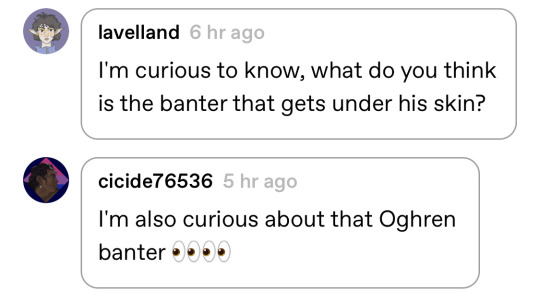
@lavelland @cicide76536
it’s really me pulling a lot out of something very minor—like i say, pretty much nothing can keep zevran down for long—but i was talking about this banter
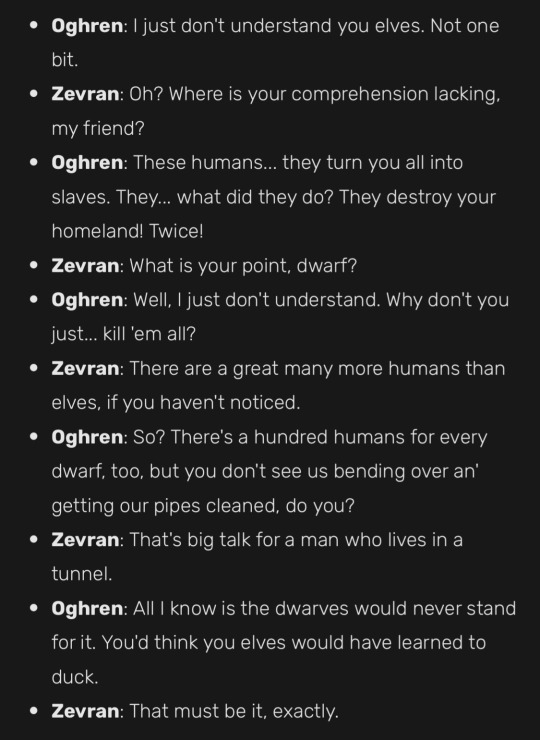
it doesn’t stand out at all if you just listen to it by itself, but as someone who has spent a considerable amount of time in game with zevran and listening to zevran’s dialogue, the tone with which zevran says “what is your point, dwarf?” and “that must be it, exactly” really jump out. i actually heard this one for the first time in game and it genuinely startled me
the way he says “what is your point, dwarf?” is... totally antithetical to everything about his usual style of speech. it not only abandons the light, playful tone he never drops, it’s short, blunt, and tells his conversation partner to get to their point already. a far cry from his usual long-winded style of evasion, dancing around the topic at hand, right? and calling oghren just “dwarf” is actually him picking up oghren’s style of speech. under normal circumstances, zevran refers to oghren by name or, on multiple occasions, “my fine dwarven friend”. he even calls him “my friend” in this banter before oghren gets too far. it’s oghren who addresses zevran simply as “elf”. it’s really odd that on one particular occasion zev abandons his cheerful facade and, for lack of a better turn of phrase, descends to oghren’s level. his charm and friendliness are a survival tactic. if he abandons that, even briefly, that’s notable!
he does try to recover it with a cheap shot like “that’s big talk for a man who lives in a tunnel”, but he lets it slip again with the dry, dark tone of “that must be it, exactly” (which is odd again when overly enthusiastically agreeing with something he clearly disagrees with is his usual method of escaping a conversation; see wynne)
i don’t have entirely solid analysis on why this of all places is where zevran loses his cool but like... i think it’s hard to treat as an analysis when it’s such an obviously understandable thing to get angry over! compare to his response if you allow or take part in anti-elven atrocities in the game. but i think it’s notable as a point of characterisation for zevran, who is so in control of himself usually, that even in conversation this can be made to get to him. it matters, and he responds to it, whether he wants to or not
390 notes
·
View notes
Text
How Mikey Loves and Proposes
Okay so some of my headcanons for him align with my beliefs however I am very particular about characterisation so I'm gonna keep it balanced.
Genuinely i think Mikey does not need the paperwork, the title or official testimonies to consider himself your husband. Once he has sort of outgrown 'boyfriend', like maybe he's in his mid to late 20s, he wants a new title because boyfriend was very highschool.
Imagine every single thing a couple could be, it has been done. Shared apartments, pets, joint bank accounts. I genuinely think because of how devoted Mikey is with his people, he would be just as devoted to his partner.
He is a people person, he finds his people and he keeps them close to his chest no matter what happens. He has forgiven his people for the unforgiveable. Very very ride or die type of person. So out of everyone, he is devoted and loyal.
I will say, in cases of fucked up timelines...chances are he would either keep you at an arm's length, push you away and disappear or just be cold. He does this because he considers himself a danger. I don't care if he has hurt his friends, I dont care about dark impulses, that man would never lay a hand on you. Dark impulses are strong, his love for you is stronger.
If he does run away, he will never look at another person ever again. Loyal as fuck.
But we are talking about final timeline so LETS GO.
At some point, he just wants matching wedding rings, he just wants people to look at you and then look at your left ring finger and be like 'oh fuck, they're taken'. You're already his, ya'll probably have matching bracelets or necklaces that he bought with his very first paycheck. But he really craves that moment where you call him 'husband'.
He probably felt connected to you in an everlasting sense from the moment ya'll started dating. This commitment was from the soul from the get go.
So why does it take like 6 to 7 years into the relationship to get married? Firstly I just have a general rule that marriage should come after 5 years minimum because it's paperwork and a big process. You can disagree and just add in your own minimum but again...adding that no matter what, ya'll live together, wake up every morning together, build a future together. At some point, you guys are too busy getting jobs, being adults and hanging out with friends to be like 'ooooo marriage'.
How does Mikey propose?
i think it was spur of the moment, maybe it hit him that OH ya'll arent married and suddenly he has the urge to say it.
And one night, it's 2am and you wanna go on a night ride and he never says no to you so he wraps you in one of his jackets and both of you head on a ride.
And it's peaceful and maybe Mikey is having a moment where he's like 'I have died, been reborn and saved multiple times for this moment. I am meant to be alive so I could be with my person. I'm very happy I am alive.'
And he's blinking back tears, stopping close to a convenience store..using snacks as an excuse to stop.
And while he's walking through the place, grabbing his usuals and your favourites...maybe it's the fluorescent lighting or the way you're picking out the drinks, maybe it's because how you look in his clothes or because it's late and you're here with him getting snacks, maybe he is sleepy and warm that he says:
"I wanna be your husband."
And the place is too quiet to not hear it, the cashier is like 'what the fuck dude, you're gonna get smacked for proposing like that' but you look at him and his teary eyes and lovesick smile and you're just speechless. But you move forward to hold him, he wraps his arms around you and presses you close to him. It's warm and engulfing.
And maybe you give an excited 'yes' or maybe you make a joke about where your ring is or maybe it's a soft whisper of an answer...in any case....the answer had been given way before he had even asked it.
#mikey x reader#tokyorev headcanons#tokyo rev fluff#mikey headcanon#mikey imagines#mikey x you#tokyo rev x you#sano manjiro x reader#tokyo revengers sano manjiro#manjiro sano x reader#manjiro x reader#manjiro x y/n#manjiro x you
336 notes
·
View notes
Text
Folks going "WHAT they made a show about the Fallout franchise?? I've been hearing people say Bethesda messed it up, but I haven't watched it myself, so I'm going to trust the word of other people -- some of which also haven't finished watching it" is driving me insane.
Being a hard core fan of something obviously brings with it a lot of passionate feelings when adaptations come into play. Of course, there's going to be people going "but in 8 episodes of the first ever season they made, they didn't explore Theme C or D, didn't introduce factions E and F and G, and because the source company is notorious for its scams, we and everyone else who's a TRUE fan should hate it".
The Amazon Original series Fallout follows the videogame franchise of the same name. It is a labour of love and you can tell by the attention to detail, the writing, the sets, and YES THE THEMES ARGUE WITH THE WALL. It's clearly fan service. I mean, the very characterisation of Lucy is a deadringer for someone playing a Fallout game for the first time. She embodies the innocent player whose expectations drastically change in a game that breaks your heart over and over again. Of course, she's also the vessel through which we explore a lot of themes, but I'll get to that.
There're some folks arguing that the show retcons the games, and I gotta say... for a website practically built on fandom culture, why are we so violently against the idea of someone basing an adaptation on a franchise that so easily lends itself to new and interesting interpretations? But to be frank, a lot of what AO's Fallout is not that new. We have: naive Vault dweller, sexy traumatised ghoul that people who aren't cowards will thirst over, and pathetic guy from a militaristic faction. We also have: total atomic annihilation, and literally in-world references to the games' lore and worldbuilding constantly (the way I was shaking my sister over seeing Grognark the Barbarian, Sugar Bombs, Cram, Stimpaks, and bags of RadAway was ridiculous). Oh, and the Red Rocket?? Best pal Dogmeat? I'm definitely outing myself as specifically a Fallout 4 player, but that's not the point you should be taking away from this.
The details, the references, and the new characters -- this show is practically SCREAMING "hey look, we did this for the fans, we hope you love it as much as we do". Who cares that the characters are new, they still hold the essence of ones we used to know! And they're still interesting, so goddamn bloody interesting. Their arcs mean so much to the story, and they're told in a genuinely intriguing way. This isn't just any videogame adaptation, this was gold. This sits near Netflix's Arcane: League of Legends level in videogame adaptation. Both series create new plots out of familiar worlds.
Of course, those who've done the work have already figured out AO's Fallout is not a retcon anyway. But even if it was, that shouldn't take away from the fact that this show is actually good. Not even just good, it's great.
Were some references a little shoe-horned in to the themes by the end of the show, such as with "War never changes"? Yes, I thought so. But I love how even with a new plot and characters, they're actually still exploring the same themes and staying true to the games. I've seen folks argue otherwise, but I truly disagree. The way capitalism poisons our world, represented primarily through The American Dream and the atomic age of the 45-50s that promoted the nuclear family dynamic -- it's there. If you think it's glorifying it by leaning so heavily into in the adaptation, I feel like you're not seeing it from the right angle. It's like saying Of Mice And Men by John Steinbeck glorifies the American Dream, when both this book and the Fallout franchise are criticisms of it. If you think about it, the post-apocalyptic world of Fallout is a graveyard to the American Dream. This criticism comes from the plots that are built into every Fallout story that I know of. The Vaults are literally constructed to be their own horror story just by their mere existence, what they stand for, what happens in each of them. The whole entire show is about the preservation of the wrong things leading to fucked up worlds and people. The missions of the Vaults are time and again proven to be fruitless, unethical, plain wrong. Lucy is our brainwashed character who believed in the veritable cult she lived in before she found out the truth.
So then consider the Brotherhood of Steel. I really don't think it exists in the story to glorify the military. We see just how much the Brotherhood has brainwashed people like Max (also, anything ominously named something like "the Brotherhood" should raise eyebrows). Personally, I don't like Max, but I am intrigued by his characterisation. I thought the end of his arc was rushed the way he "came good" basically, but [SPOILERS] having him embraced as a knight in the Brotherhood at the end against his will -- finally getting something he always wanted -- and him grimly accepting it from all that we can tell? Him having that destiny forced upon him now that he's swaying? After he defected? If his storyline is meant to be a tragedy, it wouldn't surprise me, because Fallout is rife with tragedies anyway. And a tragedy would also be a criticism of the military. That's what Max's entire arc is. It goes from the microcosm focusing on the cycle of bullying between soldiers to the macro-environment where Max is being forced to continue a cycle of violence against humanity he doesn't want to anymore because a world driven to extremes forces him to choose it to survive (not to mention what a cult and no family would do to his psyche). Let's not forget what the Brotherhood's rules are: humankind is supreme. Mutants, ghouls, synths, and robots are abominations to be hated and destroyed. If you can't draw the parallels to the real world, you need to retake history and literature classes. The Brotherhood is also about preserving the wrong things, like the Vaults (like the Enclave, really). They just came about through different method. The Enclave is capitalism and twisted greed in a world where money barely exists anymore. The Brotherhood is, well, fascism plain and simple.
Are these the only factions in the Fallout franchise? Hell no. But if you're mad about that -- that they're the main ones explored, apart from the NCR -- I think you're missing the point. These themes, these reminders, are highly relevant in the current climate. In fact, I almost think they always will be relevant unless we undergo drastic change. On the surface-level, Fallout seems like the American ideal complete with guns blazing that guys in their basements jerk off to. Under that surface, is a mind-fuck story about almost the entire opposite: it's a deconstruction of American ideals that are held so closely by some, and the way that key notion of freedom gets twisted, and you're shooting a guy in-game because it's more merciful than what the world had in store for him.
I mean, the ghoul's a fucking cowboy from the wild west character he used to play in Hollywood glam and his wife was one of the people who helped blow up America in the name of capitalism and "peace". There are so many layers of this to explore, I'd need several days to try and keep track and go through it all.
The Amazon Prime show is a testament to the Fallout franchise. The message, the themes? They were not messed up or muddled or anything of the sort, in my opinion.
As for Todd Howard, that Bethesda guy, I'm sure there's perfectly valid reasons to hate him. I mean, I've hated people for a lot less valid reasons, and that's valid. We all got our feelings. But the show is about more than just him. My advice is to keep that in mind when you're judging it.
#fallout series#amazon prime fallout#amazon prime video fallout#amazon fallout#prime fallout#fallout#besthesda#todd howard#fallout spoilers#some light analysis#the american dream#militarism#lucy mclean#maximus fallout#cooper howard#the ghoul#I know they're not planning a skyrim adaptation and that's fine#I prefer it remaining in its videogame medium while I write fanfics#so if they had to adapt any of their games I'm actually glad it was fallout#also please forgive me I wrote this very late at night so there's probably a bunch of mistakes#and I've played fallout for like six years and still don't know anywhere near as much as the hard core fans but I'm also not a newbie
120 notes
·
View notes
Text
Kaveh's Drip Marketing
I have a lot to say about the connections between the Kaveh info that released today and Alhaitham (and what we know about their relationship with each other). I'm not looking at this in a romantic way necessarily, but just in how tightly knotted their characters are with one another.
First, Kaveh's title and description:
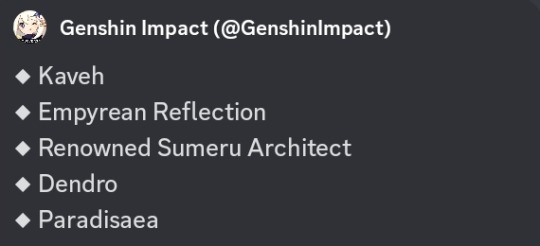
"Empyrean Reflection", or more simply, 'Heavenly Reflection'. This ties to his constellation, "Paeadisaea", which is the genus for the birds of paradise. 'Paradise' is a more general term for Heaven, but neither of these are particularly divine in nature in a deity sense. Personally, I think they might be denoting a reference to the Golden Ratio, AKA: Divine Proportion. It's a mathematic concept often used in artistry, which matches well with Kaveh's archectural design profession and his education from the Ksharewar Darshan, which is the Sumeru school of technology.
So that's what it means for Kaveh's own characterisation/lore imo, but it also links to Alhaitham. Firstly, Alhaitham's constellation is also a bird (Vultur Volans, or essentially 'vulture' even though his name means hawk), which is a nice match to Kaveh's birds of paradise. But more interestingly, this is what Alhaitham's Character Story 4 has to say about why he lets Kaveh live with him:
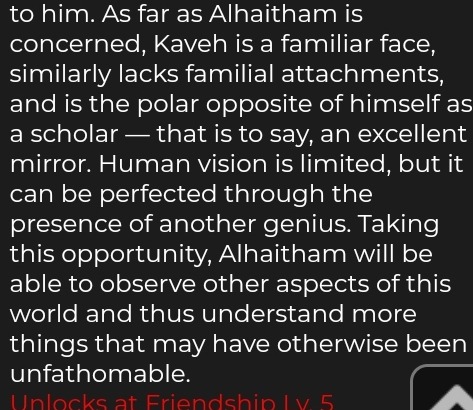
He views Kaveh as a "mirror". What is Kaveh's title again? "Empyrean Reflection".
And the mirroring is all over the place. Here's a section from Alhaitham's drip marketing from December:
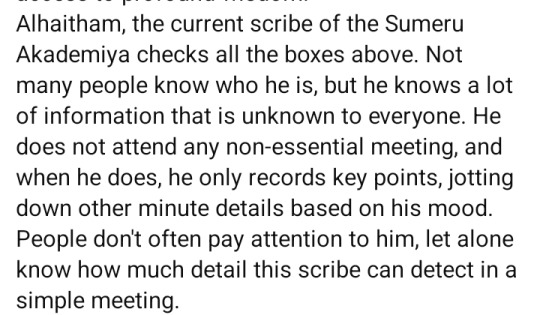
He is
Largely unknown
Only puts in the minimum effort required to do his job
People don't pay attention to him
In contrast, here is a corresponding section that came out with Kaveh's drip today:
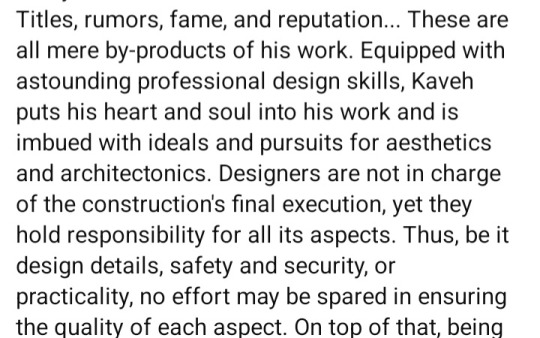
He is
Extremely well known
Incredibly hardworking
People pay attention to him even when he isn't asking for it, as a by-product of his career
Basically exact opposites; complete mirrors. Here's something else, first from the end of Alhaitham's description and then second from the end of Kaveh's:


Alhaitham's life is super comfortable, ideal in every way he desires. Meanwhile Kaveh is practically crippled by anxiety, made uncomfortable by his life circumstances. The wording itself is mirrored!
Ofc, Kaveh and Alhaitham provide one another's corresponding quotes in the drip marketing. Here is what Kaveh has to say about Alhaitham:
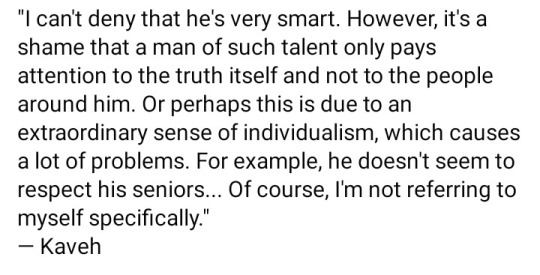
This is an amusing quote, basically a backhanded compliment of "oh he's very smart but he's too self-centred so his talents are made worthless since he never uses them to help others". Alhaitham's quote about Kaveh goes like this:
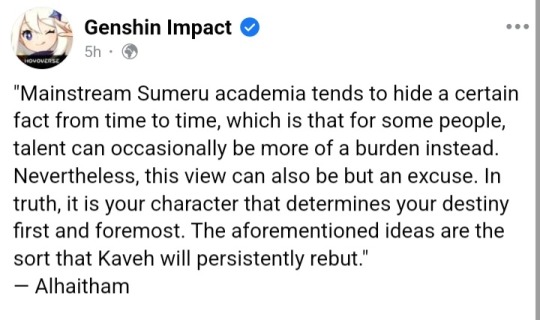
Alhaitham is a little more wordy so I'll simplify -
Talented people have a lot of outside pressure on them, which can be a burden
However, letting other people get you down is a character flaw, not an inherent part of being talented
Kaveh disagrees
Once again talking about an individual's talents and how worthwhile they are in the context of a society. Where Kaveh complains that Alhaitham can never accomplish anything worthwhile with his skills because he doesn't take other people into account, Alhaitham argues that Kaveh gets nothing done as a consequence of listening too much to other people's expectations. It's not surprising, then, that Kaveh is bankrupt but successful and Alhaitham is comfortable but unknown.
It's like - can these two stop talking about each other for five minutes? Anyway, this post turned out to be more of a collection of Kavetham quotes, but I think it's hard not to draw comparisons. I'm looking forward to seeing Kaveh's actual voicelines if there's this much material just from one marketing post lol
#alhaitham#kaveh#genshin impact#al haitham#kavetham#haikaveh#drip marketing#theory?#analysis#i love these two#idk if Kaveh's title being reflection is supposed to relate to Alhaitham's whole mirror thinh#which BTW Alhaitham's whole kit is about maintaining as many mirrors as possible#like what babe you need your bf?#anyway#this much cannot be a coincidence#and while it's certainly not inherently romantic#there is something to be said for the intimacy of being your roommate's perfect reflection
673 notes
·
View notes
Note
I think i might’ve already asked about this somewhere here (bad memory lmao) but,
I often think about Minimus Ambus, and although i headcannon him as being not too fond of sex/interfacing, i do also think it's fun to portray the lil' dude as someone who just doesn't have the time to please himself, or maybe he feels that as a role model, the ultimate hero, the immortal lawman, he isn't meant to be 'impure' (guilt ooooh, similar to how you seem to characterise Drift). But i digress.
What if the Magnus armour had a spike n' valve? (it was cast in the original Magnus's image so i don't see why not). Imagine Minimus finally being freed from Tyrest's expectations and getting a moment of peace after a long day of chaos on the ship. He's feelin' a lil' warm n' tingly, but he's too embarrassed to go to anyone for company, so he decides to pop the panels off the armour and go ham. (i think i just have a thing for distension, i'm sorry). The valve is probably a lil' tight because it's not been used but Primus dammit would it feel good!
I think he'd still feel guilty afterwards and end up telling Ratchet or Rang (Rong? Ring?? Rung!!), who would then tell him that he's perfectly fine and normal for being a lil' horny sometimes.
(Also also, what if he, hesitantly, tells the science bots (I have mainly Brainstorm in mind) who then helps modify the armour with different mods n' extras) Just some stinky thoughts that keep me up at night.

Anyways, sorry for making this so long!
OKAY SO WE FUNDAMENTALLY DISAGREE ON MINS SEX DRIVE BUT I DO LOVE THIS TAKE.
Personally, I have my own set of thoughts and beliefs about minimus, namely that I think he's a kink freak by way of loving rules and not by way of actual sexual perversion. I will explain this later, for now, i will focus on your take.
SO... this is hot. I do think he would feel an extreme amount of shame for self pleasuring with the armour, I do think he would do it in an act of desperation after the galaxy's longest dry spell.
Artists interpretation:

and also bc im a freak i reversed the positions as well

I feel like he had to talk himself into it to, like 'poor sexual self care will lead to iritability which is bad for morale, I guess... it wouldnt hurt to do it, for the crew of course'
He feels weird about it after but then. Feels even weirder during the next shift when- when he- when uh-
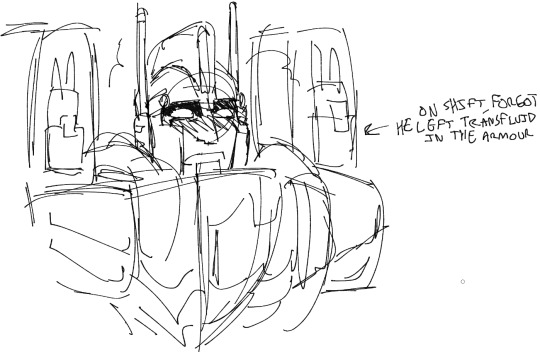
is this gross? i dont care im getting freakay.
Sorry this is turning into a long post, I'll put my thoughts on minimus's sex life in another post if someone sends me an ask about that.
lets all keep praying i don't get penis blasted by tumblr again for posting minimussy
[Send me headcanons in my inbox!! i might draw them! :D]
#transformers#my art#archie answers#my requests#mtmte#minimus#minimus ambus#ultra magnus#/nsfw#/nsft#valveplug#tf headcanons#long post
84 notes
·
View notes
Note
Apologies if you've answered this before, but I've been following you for a while and the way you approach literary analysis is so interesting, and your takes have made me reflect on and reconsider the way I approach a text and how to respond to it! So I wanted to ask: when you read other people's takes/analysis for a particular piece of media, how do you determine if it's good or not? And not in a way where you decide it's "good" in the sense that the person you're reading has uncovered the One True Interpretation you could get out of that piece of media, but in the sense where you feel like it was worth your time, and hit the spots that you're looking for in particular when it comes to media analysis.
I'm asking because I've taken to reading more media analysis and commentary online a lot more nowadays, and sometimes I'll read something I'm not quite satisfied with but can't exactly articulate why I feel that way. I never know if it's in the particular language used or in the length, or in the details, because frequently I find that at the end of my reading I don't even disagree with the take or its premise, which makes my dissatisfaction all the more confusing. So I do like hearing about how other people approach things to try and figure things out for myself, and I respect a lot of your positions, so. How do you do it?
Thank you! I feel like “good/bad” is a very broad framework to be using here; I wonder if it might be more helpful to come to conclusions about analytical work based on how useful you found it. There’s a lot of critical work that I consider to be completely useless to me, but that doesn’t necessarily make it ‘bad’ or even ‘wrong’; it’s just not doing what I want it to be doing. Some questions you might want to ask could include:
Is this elucidating? Does this explain what it purports to explain, does it answer the questions it wants to answer and/or pose new questions that weren’t immediately legible in the text? Has it developed an idea clearly? Has it given you some new angles from which you can think about the text? In short: did you get something from reading it?
Is the argument followed to its furthest possible conclusion? What I mean by this is like, media analysis is often a process of asking a lot of “why” questions: why is X like this? Why is this significant? Why X and not Y?—over and over until you run out of questions to ask. I think the big thing to watch out for here is whether or not a piece of analysis lays out its observations as though events, characterisation, relationships, etc., are phenomena emerging organically (as though it were “real life”) rather than being narrative choices made with intention (and some impetus towards figuring out what that intention is). Saying that X character is like Y is far less compelling than saying X character is like Y because Z when Z is an argument that extends beyond the boundaries of the narrative itself. Narratives are a series of deliberate choices; we want to know why those choices were made and whether we agree with them.
To give an example: let’s say we’re talking about the significance of Shiv’s pregnancy in the final episode of Succession. Following it through to its conclusion might look like this:
I start out by saying, “Tom being favoured over Kendall as CEO of Waystar is in part due to Shiv’s pregnancy reaffirming the Roy family bloodline, something that Roman establishes Kendall as being functionally incapable of doing.” The first question we should ask here is: why is reaffirming the bloodline significant?
From here we can say, well, we know it’s significant because Roman uses the word ‘bloodline’ to mark Tom/Shiv as favourable, and this tells us that there is a logic of eugenics running through Logan’s empire. This is good, but we’re still operating in wholly diegetic territory ie. the only terms we’re setting for our argument are those of describing conditions internal to the narrative. The next question we’re asking is: why are the Succession writers bringing this question of eugenics and bloodlines into play here?
From here, we can go in a bunch of different directions—for argument’s sake, we can think about Succession’s relationship to imperial/monarchic narratives of dynastic succession crises and how the show generates tension in part by transposing those narratives onto an American capitalist media empire in order to suggest that networks of capitalist hegemony and the means by which such a hegemony is sustained can be discursively linked back to such dynastic interplay. We might then point to eg. Caroline and the British aristocracy and this question of blood purity that Logan’s relationship with her + his discarding of Connor introduces; can we think about the British imperial aristocracy as a crutch on which American capitalism rests, or are we being asked to consider how these imperial superpowers are a) functionally interchangeable and b) mutually sustaining, or? We can look at the fact that Sophie Roy is brown and Iverson is implied to be autistic (and obviously the fact that neither is biologically related to Kendall and the suggestion that social ‘inferiority’ is therefore hereditary) to identify whose bloodline a practice of eugenics within hegemony seeks to retain and who it seeks to dispossess, and how this links back to the willingness on the part of the siblings to collude with (or even openly support) a fascist when it becomes in their best interest to do so. We can ask questions about reproduction of the bloodline as a means of reaping the rewards of hegemony (Shiv) or punishment within the borders of said hegemony for impotence and sexual deviance (Kendall and Roman). All of these lead us from arguments about the internal conditions of the Roy family towards conditions of the ruling class articulated through the family structure. All of this is compelling, but it begs the question of: why are we able to extrapolate all of these conclusions from the narrative configuration of the Roy family? Where in the text is it evinced that this kind of metonymic reading is coherent?
Finally, we link this back to Succession by understanding the Roy family as effectively metonymic for the ruling class as a united body (and why it’s effective for a family unit to take on such a metonymic role! What does this tell us about the relationship between the cluster of kinship relations we call the “family” and hegemony?) as is pretty transparently evinced throughout the show, and which is what gives meaning to this series of observations and allows us to extract an argument towards thematic significance out of what was initially just a set of observations about what was ‘happening’ on-screen.
I hope this is a clear example—I just went with it because most people on this website are at least passably fluent in Succession by now, lmao. The point is, you keep asking questions until you’ve followed the throughline through as far as it can be followed. In evaluating a piece of critical writing, you always want to be asking: why is this there? Why is this important? A weaker piece of critical writing will often avoid or else seem not to consider these sorts of questions. As a general rule of thumb, the more a work of critical writing seems to take for granted, the weaker it tends to be.
How well does the argument match the expectations you might have? Is this line of interrogation something that you’ve considered before, and what conclusions did you draw? Does the argument fall in line with your conclusions; does it challenge or develop them by introducing something you hadn’t considered, or do you think that your understanding identified something that the argument missed? If you were asked the question that the piece purports to respond to, how would you respond?
What are the blind spots of the argument? This is similar to the above, but is specifically concerned with asking what the piece might have missed or what assumptions might be limiting its scope. This means looking for the assumptions upon which the argument rests and trying to unpack and challenge them in order to understand how they took the form that they did. An example of this might be the kind of “female rage”/“teenage girl ferality” arguments you often see circling about Yellowjackets: what narrative does this idea of girls’ youthful ‘rage’ implicitly exonerated from harm contribute to? What do we do when we reify the idea of ‘teenage girlhood’ as a unique, impenetrable state that affords those who ‘experience’ it a uniquely elevated condition, or when we flatten these characters into the apparently equalised category of ‘teenage girl’? How do these arguments elide questions of race in Yellowjackets as regarding eg. Lottie or Taissa, and how can we follow them through to think about blind spots not only in the argument but in the show itself? No argument can feasibly encompass every possible nuance and perspective that one could bring to a text, obviously, but a stronger piece of critical writing will try to get into these underlying assumptions with depth and thoughtfulness and try to put some work into showing why they came to the conclusions that they came to; again, it’s about what gets taken for granted, what the writer presumes can go unspoken, and whether we ought to drag it to the surface and take a better look at it.
How well is the argument substantiated? Here I would expect reference to the source material—how well are these references selected? Are they consistent? Is there some cherry-picking happening—can you think of a point in the text where the claims being made might be challenged or contradicted? Does the argument impose stasis or unilaterialism onto something that in the text is in fact depicted as dynamic or otherwise in development? How well does this hold up with your interpretation of these moments—can you interpret them differently? What do you make of that ambiguity?
Can you place a value judgement on the argument made? In other words: do you agree? This is basically just about synthesising your responses to all the other questions and evaluating how on the mark you think the argument is; how you would respond to it, how you might develop it, how it might have developed your understanding of the work or else can be applied to other parts of the text (or indeed, other texts).
Ultimately I think the best thing you can do here is develop your own positions on texts to the best of your ability—I find that writing my arguments out helps me to get to grips with them better—and engaging with analytical work relative to that, ie. going in with your own solid sense of understanding from which your response can be crafted; I have an older post here on some of the questions you can start asking when you’re looking to do so. Obviously this means keeping an open mind towards arguments that contradict your own or that you may not have thought of before, but knowing what you think and why you think it will make it a lot easier to notice what might be missing or contradictory in someone else’s work (or, again, what you yourself might have missed). Critical work is (imo) best thought of as a dialogue rather than a straightforward imparting of knowledge; how someone else’s analysis informs your own, and how yours informs theirs, without flattening this dynamic into a deference of superior authority on either end, is the clearest and most productive way to think about it all.
I hope this is helpful!
240 notes
·
View notes
Text
Danganronpa Project Eden's Garden: Animal Symbolism
Okay, so I just finished the prologue (adored it, the writing is impeccable), and noticed that each character features an animal on their clothing. I'm sure tons of people have pointed it out already, but I thought it'd be fun to go through the symbolism of each, alongside any other observations I had.
Damon Maitsu:
Damon's signature animal is one of the more obvious ones - it's the big snake on his tie. Biblically, snakes are kind of a big deal... Just one snake, really, which gave all of the others a bad name. In 'Garden of Eden' arc of the Bible (which is relevant for obvious reasons), a snake tempts Eve to eat the forbidden fruit. The snake basically says "Hey queen, the apple won't kill you, it'll show you the truth, God's a liar." Adam and Eve eat the fruit, condemning humanity to eternal suffering.
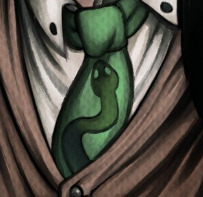
Painting Damon as the snake tells us a lot about his role in the narrative and his characterisation. The main theme for Eden's Garden seems to be 'head vs heart', or 'logic vs emotion'. While some characters lean towards emotion, Damon leans towards logic... But based on the Pathos system, he doesn't fully condemn emotion - it can be a good tool when it comes to winning arguments, after all.
At the end of the prologue, Damon disagrees with seeing the good in everyone. He argues that the ultimates are more likely to stab each other in the back than to help each other unconditionally... In other words, he argues that ultimates are ambitious, to the point of throwing away their morals - because he himself is ambitious to a fault.
While a lot of people see snakes as creatures of evil (particularly when it comes to THE snake in the Bible), it could be argued that the snake is an agent of the greater good. Yes, the snake was the catalyst for the fall of humanity, but you could argue it was also the catalyst for the first critical thought. Adam and Eve questioned the word of their creator and chose to go against him. That didn't end very well for them, but you could argue it liberated them.
Would you rather be a sheep, at the mercy of your shepherd, or a snake that sees the world for what it truly is?
Wolfgang Akire:
Speaking of sheep... Wolfgang has a pretty neat (very symbolic) sheep pin. The idea of him picking out a sheep pin in like... a Claire's Accessories is very funny to me.

Much like snakes, sheep are also very Biblically relevant. In the Bible, God's people are usually cloaked in sheep imagery. God is the shepherd (fun fact: 'shepherd' derives from 'sheep' 'herd'), and the sheep are at his mercy. In that light, a sheep is a truly powerless thing.
Perhaps Wolfgang's sheep pin denotes him as a follower rather than a leader. Not to a specific person, but rather to an ideology - to his own morals, which he seems very attached to. Sheep are often seen as weak, existing only to be devoured by stronger, more predatory animals.
But this symbolism might exist here to be subverted. One of the most popular sheep-based phrases is (drum roll please): "Wolf in sheep's clothing".
Lawyer man is, quite literally, a wolf in sheep's clothing. His name has the word 'wolf' in it. He has a sheep on his clothing.
Does Wolfgang obsess over justice due to a guilty conscious? Is it a cover to mask his deepest, most despicable thoughts? Only time will tell, but I'm onto you, lawyer man... If that's even your real name.
Eva Tsunaka:
Okay, so I'm not 100% sure if Eva's animal is a raven or a crow, but I don't think it matters too much, people tend to perceive 'ominous medium-sized black bird' in a similar way, regardless of the specifics. Eva has a black feather in her hair and a badge with a bird's head on it. The badge looks a little bit emu-ish (which would be really funny), but the general vibe is more in line with a crow/raven.

For simplicity's sake, I'll mostly talk about ravens, because I think (don't quote me on this, I have not read the actual Bible) crows are never actually mentioned... but ravens are, so we'll go with that.
SO, ravens, black birds. Apparently, the first bird to be mentioned by name in the Bible is the raven, which... lines up with Eva being the first named bird character we meet (there are a lot of bird people, we'll get to it). During the whole Noah's Arc debacle, Noah sent out a raven to scout for dry land - it didn't come back (I think? It gets mentioned, 'tos and fros' and then doesn't get mentioned again, so I think it dipped which honestly, girlboss move).
Other than that, a raven was used as a divine messenger at one point, but I think the much more interesting (and relevant) aspects of the raven is the general symbolism.
Ravens are usually seen as bad news - much like the snake, they get a bad rep. While they are often seen as bad omens, they can also be seen as beings of spiritual wisdom. They see more than others can, much like Eva. When the others start to do the whole 'We'll never kill each other!' it's Eva who disagrees, seeing the reality of the situation.
Based on the word 'Danganronpa' being associated with the game, we can assume she's correct, and that the bodies will start hitting the floor very soon.
Eva is wise and holds a lot of knowledge, but she is distrusted for reasons outwith her control. She didn't ask to be the ultimate liar - some random organisation sent her a letter one day putting that label on her.
Interestingly, ravens are the natural enemies of farmers... and Wolfgang has a distinct agricultural reference on his lapel.
To summarise: people don't like ravens, but they're very smart birds who can (in certain mythologies/cultures, at least), see beyond the surface level).
Toshiko Kayura:
Toshiko's assigned animal is a little harder to spot. Two flamingos are on her skirt as a decal, making them less obvious (especially during waist-up shots).
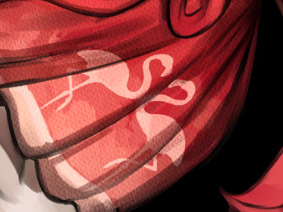
Okay, so I'm no expert on this, but I'm pretty sure there aren't any flamingos in the Bible. Flamingos played a part in Egyptian beliefs, being associated with Ra, and they might actually be the original inspiration for phoenixes which... is kind of hilarious? The Aztecs saw them as sacred, and in Hindu culture they symbolise hamsa, a divine vehicle, which symbolises the realise from samsara, aka the cycle of suffering.
So... that could be a thing relating to Toshiko. She could be destined to act as a turning point in the narrative (either through death or through character development, same difference).
Or, we could go with the really obvious interpretation of 'flamingo = romance'. Which is very on-brand. Additionally, flamingos represent balance and elegance - mainly because of their 'standing on one leg' trick. Toshiko most likely strives to embody the qualities of a flamingo in these regards.
The use of flamingos in Toshiko's design might point to her being 'the heart' of the group. She's shown to be quite emotional (becoming flustered when challenged, avoiding the investigation, getting into an argument over gremlin-hood with Grace), despite trying to emulate a mature aura. She speaks in frivolous, convoluted imagery, which is peak fourteen-year-old behaviour, and if anything bad happens to her I will cry :D
Ulysses Wilhelm:
Rather than having a picture of an animal, Ulysses wears an owl pendant. Owls represent wisdom, and are particularly fitting for Ulysses due to him being more of a night owl.

Biblically, owls are seen as unclean birds, alongside ravens. They aren't overly relevant, but are (allegedly, according to some random Bible forum) used to symbolise loneliness, desolation, guilt and mourning. In a broader sense, owls are seen as wise, critical-thinking creatures, and independent.
Because of this, I think Ulysses will fall into the Damon/Eva camp of thinking, due to his historical knowledge. Because if history's taught us anything, it's that people can't be trusted, they will self-sabotage, and murder is inevitable.
I don't have much else to say - Ulysses feels like an early victim/blackened candidate, unfortunately, so I don't think he'll be playing a major role narratively.
Desmond Hall:
This one's a little hard to spot immediately (and when I did spot it, I wasn't sure which animal it belonged to), but according to the concept art Desmond has a shark tooth earring.

There are no sharks in the Bible. Sharks, apparently, symbolise protection and guidance, so I think Desmond will probably pair up with another character... which will lead to an untimely death, with a very sad flashback scene at the end of a trial. Or he'll survive, who says Biblical relevancy matters? Sharks are pretty cool and so is Desmond.
I think he'll be an optimist in the situation, but I... don't have much to say regarding his animal motif.
Grace Madison:
This one is pretty up there for the 'easiest to spot award'. Grace's animal is a rabbit, which can be seen by her (adorable) rabbit-eared visor.

Biblically rabbits are pretty irrelevant, but symbolically they're very prominent. Rabbits are probably most famous for their easter connotations (you'd think they'd be Biblical, but no, it just says not to eat them). Rabbits are also known as lucky animals - 'rabbit feet' are seen as lucky talismans...
If Grace ends up with a severed foot, I'm going to lose my mind.
Anyway, since Grace is the resident 'reckless and crude' character, I would theorise her link to rabbits would be 'rebirth'. Rabbits are associated with spring, which is associated with rebirth. I think Grace (who is described as someone who burns every bridge she makes) will undergo the Fuyuhiko treatment and see a lot of character development.
Not much else for me to say here, but rabbits are generally seen as active animals (energiser bunny, the Scorbunny line), so... yay sports..?
Diana Venicia:
I do not trust this girl as far as I can throw her. I saw her across the room and thought, "No, you're evil", and the chameleon bracelet did not help her case.

Like... not only does it suggest she's hiding something, or that she's a social chameleon, but it looks like a handcuff, that cannot be comfortable. And oddly enough, chameleons do feature in the Bible... and it's very odd, and very interesting.
Basically, chameleons conform to their surroundings through their unique abilities. God likes that for them, but not for humans - apparently, they should challenge things rather than just conforming to them. Which like, okay, someone changed their tune from "Don't do this one thing, no I will not elaborate". In actuality, what this means is "you should not be different on Monday to how you were on Sunday", aka, be #authentic.
Also, chameleons are seen as 'not standing up for what's right', so I guess that's where Diana falls on the morality spectrum, maybe possibly?
Diana is hiding something, she's on my mastermind radar but it feels a little too obvious? If she's not a mastermind, she hiding something and is a killer, nothing can redeem her from being shady in my eyes. I'm onto you, make-up girl...
(My guess is the beauty industry/Hollywood requires a degree of fakery, and she hates it, but she wanted to be successful so she gave into the fakery, and lost her true self in the process. And hey, maybe at some point she decided that she had to see the true twistedness of humanity via a killing game, who knows? Plus, make-up, that's very Junko-ish of her, just saying-)
Jean DeLamer:
Okay, so some people got 'owl' or 'flamingo', but this man got a whole dragon. And he cannot be more deserving of it, fly high king.

I really didn't think there were dragons in the Bible, but apparently they get a mention (in all fairness, it's a real big book). Fun fact: Biblically, they are usually mentioned to reference sea monsters. On brand for our sea captain. Bad news though, dragons are pretty exclusively evil (sometimes straight-up Satan), and are vanquished by God. So... Not great for Jean, honestly, that's concerning.
Could he have a connection to the killing game? He could be a traitor of some sort, or he could try to rise up against the KG and get struck down.
Basically: Jean has no power here, he will lose every time, if the Bible-dragons are anything to go by.
Anyways, dragons are pretty relevant in... most cultures, so this is probably the most interesting thing I can dig up.
Jett Dawson:
In my original post, I mislabelled Jett's animal as a wolf. Somebody in the comments corrected me, pointing out that it's a coyote. Coyotes are closely related to wolves, so there's some symbolic overlap, but I'll rewrite the section anyways, because the original didn't shed much light on anything.
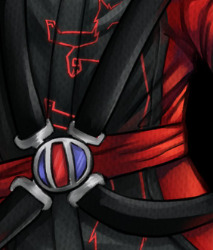
Biblically, coyotes are in a bit of an odd spot. They're seen as cunning and dangerous for the most part, but in Isaiah's passage (disclaimer: I haven't read it, I'm doing the deeply unacademic thing of trusting 'straightforwardguidance'.com) he complains that coyotes and lizards are more grateful to him than humans. This is used to demean the coyote; a wild animal is better than people in Isaiah's eyes, placing them at the low end of societal importance (not literally, ofc).
Apparently, the bible also describes these animals as being wise, due to their hunting tactics. Coyotes will hunt rabbits as a team, with one tiring a rabbit out and another finishing it off. This little tidbit does not bode well for Grace, our rabbit. But, to be fair, the presence of a coyote wouldn't go well for most small animals.
I don't have too much to say about coyotes, beyond their obvious similarity to wolves. Wolves tend to hunt sheep (which gave them a bit of a negative biblical rep), but let's be real, a sheep isn't winning many battles out in the wild.
Jett strikes me as a 'tragic killer', like our usual chapter 2/4 killers. There's wildcard energy to him, though - I could see him killing, surviving or dying, but whatever happens, there'll be a plot point surrounding his face, it seems too interesting to not be a thing.
Kai Monteago:
Butterfly, on chest, let's go.
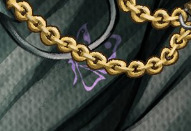
Most obvious interpretation: social butterfly, he's an influencer.
Biblically, they're pretty irrelevant, but symbolically they're all about transformation. This could indicate character development, a change in tune, etc. Not much to say here, it could represent vulnerability (butterflies are fragile), but it's most likely a reference to the phrase social butterfly.
Mark 'Mayhem' Berskii:
His hat is, indeed, an alligator. At first I thought it was a dragon, then a crocodile, but the concept art confirms it to be an alligator.
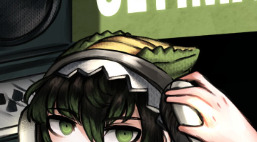
Google couldn't tell me much about Bible alligators, which was expected. What it can tell me is the symbolism behind them, though.
Alligators are cunning and wise. Which adds up here, Mark seems way smarter than he lets on. He makes a comment at the end of a non-stop debate (something about setting the trash fire) which suggests he's a critical thinker, seeing the misguided logic in the room.
They are also apex predators with a lot of strength which... is concerning, in terms of potential murderers. Since they've been around since the prehistoric age, alligators are seen as having an ancient, primal aura about them.
I feel there's more than meets the eye with Mark - he'll carry a key discovery or two, just you wait.
Wenona:
Wenona is the girlboss we need, as well as the girlboss we deserve, no further questions. Her animal decal is a little less obvious than others', being bear pawprints at the bottom of her coat.

My favourite Bible story ever (because it's hilarious out of context) is the one about Elisha and the bears, where two bears maul forty-two children because they made fun of a guy. So, maybe don't get on her bad side via mockery.
Interestingly, bears are used to symbolise cruelty and self-servedness which... adds up here, I guess.
Symbolically, bears are a little more cuddly than the Bible makes them out to be. They're known for hibernation, making them quite patient and cautious animals. Bears are grounded animals and represent strength, being fearsome predators.
Wenona is very set in her views, and appears to be unwavering, much like a bear.
Eloise Taulner:
Eloise wears a swan pin in her hair, making that her signature animal. Swans are graceful and vicious; a fascinating combination for a character like Eloise.

In the Bible, swans are everything you'd assume a white bird to be. It's all very 'this bird is the serene love of god, do not eat it, but for different reasons'.
Symbolically, swans are loyal birds, being of the 'mates for life' variety. Something interesting to mention is the concept of a swan song - a song that laments death, said to be the most beautiful song ever sung by a swan, despite the birds being far from natural singers. In Greek mythology, swans were sacred to both Aphrodite and Apollo, with Apollo being the god of music.
Which presents the possibility of a friendship between Mark and Elodie, with him being 'music' and her being a swan.
Swans are very powerful birds, so Eloise's character arc will probably involve her becoming stronger in terms of willpower and confidence.
Ingrid Grimwall:
This one's a little harder to spot, but Ingrid's animal symbol is on her bag, in the form of a lion.
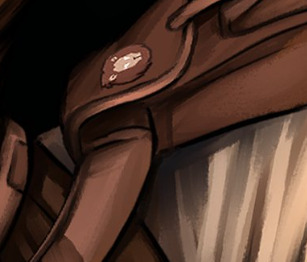
Lions are generally seen as brave, proud animals. The main Biblical story that comes to mind is the story of Daniel, who was thrown into a den of lions. A lion's roar is intended to paralyse its foes with fear, but can its bite match its bark? I suspect Ingrid will be a big talker, but less keen to take actual initiative. Male lions are known for being less active than their pride members, with the female lions doing the hunting.
Although, you could argue that a lion is a natural leader. These qualities don't need to be exclusive though - why not be a leader and a layabout?
Besides that, there's pride and family and strength, but the less prominent placement of Ingrid's emblem tells me she'll be less fearsome than her classmates.
Cassidy Amber:
Cassidy's a little bit different from the others. Her animal motif doesn't have a specific portrayal of the animal (much like Wenona's and Ulysses'), and hers is repeated as a pattern - Cassidy wears tights with a spiderweb pattern.

Now, spiders are pretty well known for trapping things. It's kind of their whole deal. This gives Cassidy some serious mastermind vibes to me, especially when coupled with the fact that she's married to the content grind, loves games, and has a lot of money to throw around.
But anyway, the Bible just kind of complains about their webs being fragile, which could be interpreted as 'her fanbase isn't a true connection to others, they'll abandon her the second someone new catches their attention'. In reality, the Bible doesn't hold up for most of these, but like... it's interesting, right?
Spiders could be described as patient killers. They weave intricate webs for their victims and wait for the opportune moment to strike. Spiders are often feared, with arachnophobia being one of the most popular phobias. Cassidy herself is capable of projecting an unsettling aura and might be described as unnerving.
Fun fact: Red spiders specifically symbolise wealth, passion and excitement, which lines up pretty well with our pro-gamer.
In Conclusion:
I spent way too long making this.
Also, the Bible was pretty useless for most of these BUT the Bible reflects a lot of general perceptions (because it set quite a few of them), so it was sometimes interesting, I think, I'm tired, send help, goodnight!
(If you've made it this far, say hi or something, this took three hours and for what?)
#danganronpa#project eden's garden#analysis#theory#damon maitsu#eva tsunaka#toshiko kayura#wolfgang akire#other people I guess#just all the characters#project: eden's garden
752 notes
·
View notes